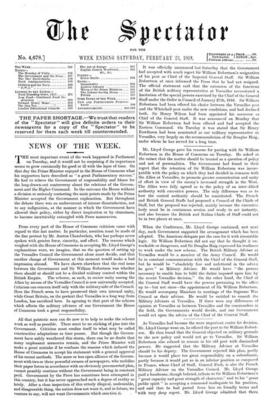As Versailles had become the more important centre for decision,
Mr. Lloyd George went on, he offered the post to Sir William Robert- son. He then found that the General objected on military grounds to the new policy and would not go to Versailles. Sir William Robertson also refused to remain in his old post with diminished powers. He suggested that the Military Adviser at Versailles should be his deputy. The Government rejected this plan, partly because it would place too great responsibility on a subordinate, partly because it would put us in an inferior position as compared to France, whose Chief of Staff, General Foch, is also the French Military Adviser on the Versailles Council. Mr. Lloyd George paid a handsome, though belated, tribute to Sir William Robertson's "great capacity and great strength of character," and to his "great public spirit" in accepting a command inadequate to his position, and said that he had parted from him on friendly terms and with very deep regret.. Mr. Lloyd George admitted that there
were still great praotical difficulties to be overcome. "You have to reconcile the unity of the Allies with the unity of the Army." If the House accepted the plaa for uniting the Allies, the Govern- ment would do their utmost to maintain the efficiency of the Army.



























